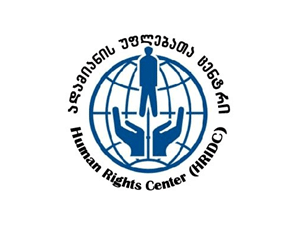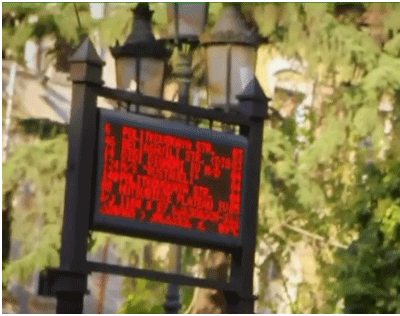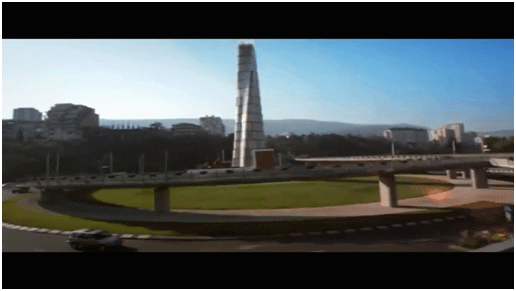Nino Tsagareishvili
Monitoring of Media-Coverage of Parliamentary Elections, which is implemented by the Human Rights Center, exposed that various advertisements aired by the Georgian Public Broadcaster [GPB] from June 18 to July 29 do not comply with the criteria set by the law for social ads and contain signs of hidden advertisement.
In accordance to Article 12 of the Law of Georgia on Advertising, social advertisement is “the object of public and national interests is aimed at the achievement of charitable purposes, protection of people life, health and property as well as environment. The permit on placement and distribution of social advertisement with respect to the advertising character will be issued by the appropriate governmental and local self-government and administration bodies.”
In accordance to Article 65 of the Law of Georgia on Broadcasting, a broadcasting license holder shall allocate free of charge at least 90 seconds per 3 hours for social advertisement.
Acting legislation does not oblige TV-Companies to put subtitles to social ads in order to mark them off commercial ones. TV-Companies individually decide which advertisement shall have social status. Consequently, in order to find out which ad has social status, we sent letter to the GPB.
Their reply of July 23 listed advertisements which have social status on GPB: “Made in Georgia,” “I Love Tbilisi,” “Free Internet from the Tbilisi City Hall.” It is noteworthy that those ads are also aired by Rustavi 2 and Imedi TV; though they have not yet replied to the letter of the HRC requesting them information which ads have social status.
Advertisement roll “Made in Georgia” represents process of building a ship. The ad has soundtrack; a worker is writing “Beach Security” on the deck and at the end of the ad we see subscription – www.police.ge
This advertisement does not meet criteria set by the law for social advertisement. The advertisement content does not show that it aims at promotion of public good and charitable aim that is necessary requisite for declaring the advertisement social. According to the definition from the Law on Advertising social advertisement shall not advertise any governmental agency or its service. Inscription at the end of the ad www.police.ge is official website of the governmental institution – Ministry of Internal Affairs (MIA). Beach Security Service is the department of the MIA. Appearance of official website of particular governmental institution and its branch in the advertisement after the ship is built underlines achievements of this particular institution and contains signs of hidden advertisement.

Video-roll –“I Love Tbilisi” does not directly advertise governmental institution of Georgia but used footage demonstrates those achievements that people associate with acting government. Throughout the video-roll we see scenes of renovated Tbilisi – reconstructed Hero Square, electronic stands of municipal transport, reconstructed buildings, new bridges, roads and theatres, which are implemented by the acting government, appear one after another in the advertisement.

The video-roll – I Love Tbilisi does not clearly demonstrate public good or charitable aims of the advertisement. Consequently, we detect signs of hidden advertisement in the ad which is released under social status.
 One more advertisement, which was aired during monitoring period and exceeds frames of legal definition of social advertising, is a video-roll – Free Internet from the Tbilisi City Hall. In this advertisement, the Tbilisi City Hall announces launch of free internet in Tbilisi from September, 2012.
One more advertisement, which was aired during monitoring period and exceeds frames of legal definition of social advertising, is a video-roll – Free Internet from the Tbilisi City Hall. In this advertisement, the Tbilisi City Hall announces launch of free internet in Tbilisi from September, 2012.
This advertisement, like all above-listed ones, advertises governmental institution – Tbilisi City Hall that contradicts definition of social advertisement. The “public good or charitable aims of the advertisement” are not clear in it though they are necessary requisites of social advertisement.
Besides that, slogan – Free Internet from Tbilisi City Hall - might sound like election promise during pre-election period if we remember that the Tbilisi Mayor and other officials of the City Hall periodically participate in the pre-election campaign of the ruling party United National Movement [UNM] and relatively are identified with the election subject. Projects implemented or planned to be implemented by Tbilisi City Hall or other governmental institutions are often discussed by the leaders of ruling party during their meetings with voters. Besides that, President Mikheil Saakashvili, Tbilisi Mayor Gigi Ugulava, Georgian ministers, leaders of regional administration and local self-governments are members of the ruling party – United National Movement. In the presence of similar political system, it becomes extremely difficult for voters to mark government’s activities off party activities.
Media Monitoring of Parliamentary Elections is implemented by financial support of International Foundation for Electoral Systems (IFES) under the framework of four-year project Increased Trust in Electoral Process (ITEP) financed by USAID (US Agency for International Development).

This blog is made possible by the support of the American people through the United States Agency for International Development (USAID). The contents are the sole responsibility of Human Rights Center and do not necessarily reflect the views of the International Foundation for Electoral Systems, USAID or the United States Government.




